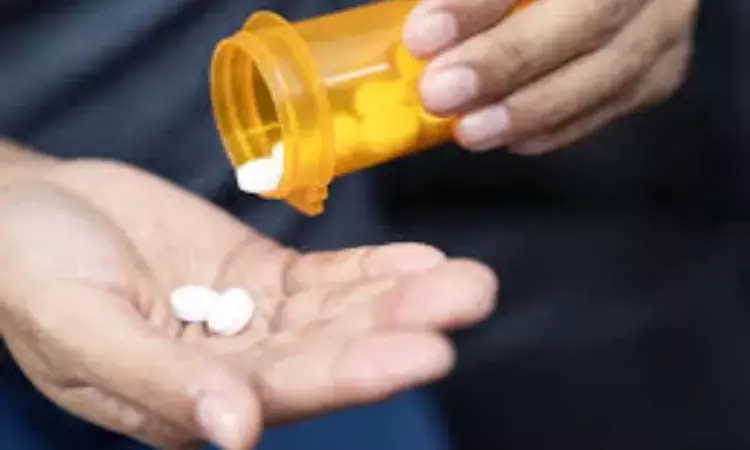- Home
- Medical news & Guidelines
- Anesthesiology
- Cardiology and CTVS
- Critical Care
- Dentistry
- Dermatology
- Diabetes and Endocrinology
- ENT
- Gastroenterology
- Medicine
- Nephrology
- Neurology
- Obstretics-Gynaecology
- Oncology
- Ophthalmology
- Orthopaedics
- Pediatrics-Neonatology
- Psychiatry
- Pulmonology
- Radiology
- Surgery
- Urology
- Laboratory Medicine
- Diet
- Nursing
- Paramedical
- Physiotherapy
- Health news
- Fact Check
- Bone Health Fact Check
- Brain Health Fact Check
- Cancer Related Fact Check
- Child Care Fact Check
- Dental and oral health fact check
- Diabetes and metabolic health fact check
- Diet and Nutrition Fact Check
- Eye and ENT Care Fact Check
- Fitness fact check
- Gut health fact check
- Heart health fact check
- Kidney health fact check
- Medical education fact check
- Men's health fact check
- Respiratory fact check
- Skin and hair care fact check
- Vaccine and Immunization fact check
- Women's health fact check
- AYUSH
- State News
- Andaman and Nicobar Islands
- Andhra Pradesh
- Arunachal Pradesh
- Assam
- Bihar
- Chandigarh
- Chattisgarh
- Dadra and Nagar Haveli
- Daman and Diu
- Delhi
- Goa
- Gujarat
- Haryana
- Himachal Pradesh
- Jammu & Kashmir
- Jharkhand
- Karnataka
- Kerala
- Ladakh
- Lakshadweep
- Madhya Pradesh
- Maharashtra
- Manipur
- Meghalaya
- Mizoram
- Nagaland
- Odisha
- Puducherry
- Punjab
- Rajasthan
- Sikkim
- Tamil Nadu
- Telangana
- Tripura
- Uttar Pradesh
- Uttrakhand
- West Bengal
- Medical Education
- Industry
Long-Term Use of Paliperidone Palmitate Ensures Stability in Schizophrenia patients: JAMA

Researchers in a recent study suggest that 6-monthly paliperidone palmitate sustains stable clinical and functional outcomes long term in adult schizophrenia. A recently conducted study has shed new light on repeated evidence of the efficacy of PP in the maintenance of stability with regard to the treatment of schizophrenia, supporting its use as a viable long-term treatment option. This study was published in JAMA Network Open by Christoph U. and colleagues.
Long-acting injectable (LAI) antipsychotics are known for their potential to improve adherence and symptom control in patients with schizophrenia, thereby promoting long-term recovery. Paliperidone palmitate, administered once every six months, is the first LAI antipsychotic with such an extended dosing interval. This study aimed at evaluating the long-term outcomes of PP every 6 months in the adult schizophrenic population over a 3-year period.
This was an open-label extension of a one-year, double-blind RCT between November 20, 2017, and May 3, 2022, involving eligible adults diagnosed with schizophrenia who did not relapse after receiving fixed doses of PP every three or six months in the previous. PP doses of 546 mg were administered on Day 1 and every 6 months until month 30 as a single, once-every-six-month dorsogluteal injection. Major efficacy measures included rate of relapse in each group, and change from baseline to endpoint in the PANSS, PANSS positive, PANSS negative, and PANSS general psychopathology subscale scores, the CGI-S Scale score, the PSP Scale score, and incidence of first relapse or exacerbation, TEAEs, and lump formations at injection sites.
The key findings of the study were:
• Among the 121 patients (83 [68.6%] male) included in the study, the mean (SD) age was 38.6 (11.24) years, and the mean (SD) duration of illness was 11.0 (9.45) years.
• At the screening of the double-blind study, 101 patients (83.5%) were on an oral antipsychotic, while 20 (16.5%) were on an LAI antipsychotic.
• During the three-year follow-up, only 5 patients (4.1%) experienced a relapse, with reasons including psychiatric hospitalization (2 patients, 1.7%), suicidal or homicidal ideation (2 patients, 1.7%), and deliberate self-injury (1 patient, 0.8%).
• Patients receiving PP every six months maintained clinical and functional stability, as evidenced by stable scores on the PANSS (mean [SD] change, −2.6 [9.96] points), CGI-S (mean [SD] change, −0.2 [0.57] points), and PSP (mean [SD] change, 3.1 [9.14] points) scales over the three-year period.
• 101 patients (83.5%) completed the 2-year OLE study. TEAEs were reported in 97 of 121 patients (80.2%), but no new safety or tolerability concerns emerged.
The study underlines the long-term therapeutic effects of dosiperidone palmitate dosing once every six months in adult patients with schizophrenia. The low rate of relapse in the six-month PP group in this setting, although PALSS, CGIS, and PSP scores were stable for more than 2 years, handsomely demonstrated the effectiveness of the treatment strategy. Moreover, the high completion rate and manageable TEAEs further support the safety and tolerability of PP.
During the 2-year OLE of the 1-year RCT, the safety and positive long-term efficacy of paliperidone palmitate, given every six months for up to 3 years, were demonstrated in adults with schizophrenia. This confirms that PP is a dependable and effective long-term intervention strategy with this illness.
Reference:
Correll, C. U., Johnston, K., Turkoz, I., Gray, J., Sun, L., Doring, M., & Sajatovic, M. (2024). Three-year outcomes of 6-month paliperidone palmitate in adults with schizophrenia: An open-label extension study of a randomized clinical trial. JAMA Network Open, 7(7), e2421495. https://doi.org/10.1001/jamanetworkopen.2024.21495
Dr Riya Dave has completed dentistry from Gujarat University in 2022. She is a dentist and accomplished medical and scientific writer known for her commitment to bridging the gap between clinical expertise and accessible healthcare information. She has been actively involved in writing blogs related to health and wellness.
Dr Kamal Kant Kohli-MBBS, DTCD- a chest specialist with more than 30 years of practice and a flair for writing clinical articles, Dr Kamal Kant Kohli joined Medical Dialogues as a Chief Editor of Medical News. Besides writing articles, as an editor, he proofreads and verifies all the medical content published on Medical Dialogues including those coming from journals, studies,medical conferences,guidelines etc. Email: drkohli@medicaldialogues.in. Contact no. 011-43720751


